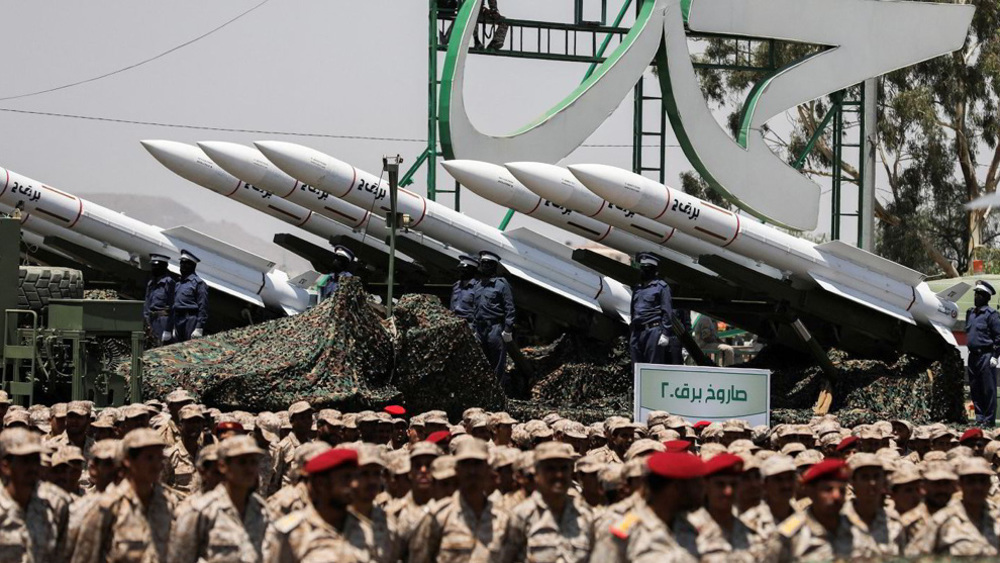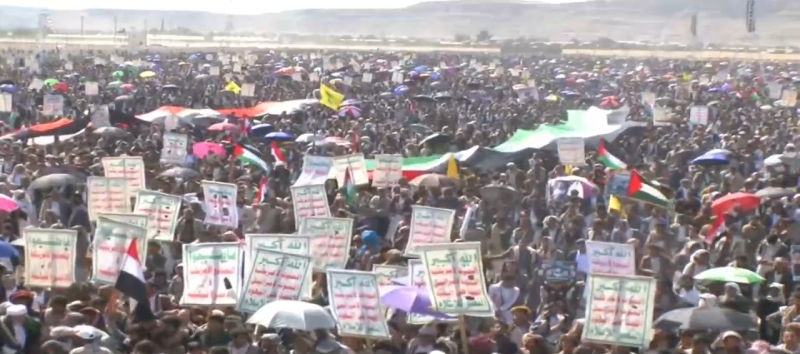Yemeni army, allies fire ballistic missile at Saudi Arabia’s King Khalid International Airport
Yemeni army forces and allied fighters from Popular Committees have reportedly launched a locally designed and manufactured ballistic missile toward an area deep inside Saudi Arabia in response to the Riyadh regime’s devastating aerial bombardment campaign against its crisis-stricken southern neighbor.
Brigadier Yahya al-Mahdi told Yemen’s Arabic-language al-Sahat satellite television network that Yemeni soldiers and their allies had fired a Burkan 2-H (Volcano H-2) missile towards King Khalid International Airport, located 35 kilometers (22 miles) north of the Saudi capital city of Riyadh, on Tuesday afternoon.
Mahdi added that the liquid propellant missile had hit its target accurately and left massive destruction at the airport.
There were no immediate comments from Saudi officials on the missile attack.
Fresh Saudi strikes claim 5 civilian lives in Yemen
Meanwhile, at least five civilians have lost their lives and two others sustained injuries when Saudi fighter jets carried out a string of airstrikes against an area in Yemen’s west-central province of Sana'a.

A local source, speaking on condition of anonymity, said the casualties happened as Saudi warplanes launched four aerial assaults against a building in the Bait Maran area of Arhab district, Yemen’s Arabic-language al-Masirah television network reported.
Earlier in the day, a child sustained serious injuries when an internationally-banned cluster bomb, dropped earlier by Saudi military aircraft, went off in the Bani Moein area of Razih district in Yemen’s mountainous northwestern province of Sa'ada.
Cluster bombs are banned under the Convention on Cluster Munitions (CCM), an international treaty that addresses the humanitarian consequences and unacceptable harm caused to civilians by cluster munitions through a categorical prohibition and a framework for action.

Also on Tuesday, ten Yemeni army soldiers were killed and several others injured when a bomber targeted a security checkpoint in the small city of Ataq, located 458 kilometers southeast of the capital Sana'a.
Yemeni snipers kill 3 Saudi troopers in Jizan
Additionally, Yemeni army soldiers and Popular Committees fighters have shot dead three Saudi soldiers in the kingdom’s southwestern border region of Jizan, in retaliation for the Riyadh regime’s military campaign against the crisis-hit country.

A Yemeni military source, speaking on condition of anonymity, told Arabic-language al-Masirah television network that Yemeni forces and their allies fatally shot the soldiers just outside Hamezah village of Jizan, located 967 kilometers southwest of Riyadh.
At least 13,600 people have been killed since the onset of Saudi Arabia’s military campaign against Yemen in 2015. Much of the country's infrastructure, including hospitals, schools and factories, has been reduced to rubble due to the war.
The Saudi-led war has also triggered a deadly cholera epidemic across Yemen.
According to the World Health Organization’s latest tally, the cholera outbreak has killed 2,167 people since the end of April 2017 and is suspected to have infected 841,906.

In November 2017, the United Nations children’s agency, UNICEF, said more than 11 million children in Yemen were in acute need of aid, stressing that it was estimated that every 10 minutes a child died of a preventable disease there.
Additionally, the UN has described the current level of hunger in Yemen as “unprecedented,” emphasizing that 17 million people were food insecure in the country.
The world body says that 6.8 million, meaning almost one in four people, do not have enough food and rely entirely on external assistance.
48-year-old Palestinian man serving 48 life terms completes 22 years in Israeli jails
From MKO to Tondar, how Germany became safe haven for anti-Iran terror groups
Hamas open to any proposal aiming to end Gaza war: Hamdan
Role of private sector in Iran’s thriving space industry
Four Palestinians killed in Israeli strikes on West Bank
Iran warns of ‘calculated, precise’ response to Israeli aggression
After year-long genocide, Israeli military hires private firms to flatten buildings in Gaza
Malaysia working on resolution to expel Israel from United Nations

















 This makes it easy to access the Press TV website
This makes it easy to access the Press TV website